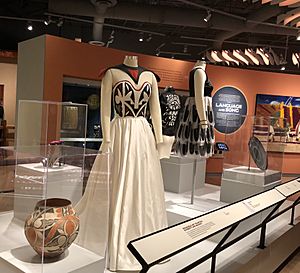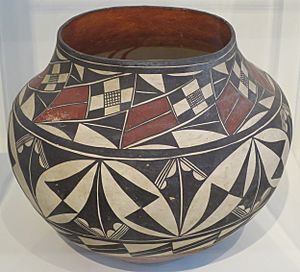Loren Aragon facts for kids
Loren Aragon is a talented Native American fashion designer. He comes from Acoma Pueblo, a community known for its amazing pottery. Loren's designs are inspired by this Acoma pottery and his culture. His fashion brand is called ACONAV. It is famous for its unique designs that mix old cultural ideas with new styles. He often uses materials like silk and leather.
Contents
Becoming a Designer
In 1998, Loren Aragon moved to Arizona. He went to Arizona State University. In 2004, he earned a degree in mechanical engineering. For 13 years, he worked as an engineer in Phoenix. But he also had a secret passion! He taught himself how to make clothes and design fashion. He learned by carefully taking apart dresses to see how they were made. After many years, he decided to become a full-time fashion designer.
His Creative Work
Loren grew up watching his mother and aunt. They made traditional Acoma clothing. He first started making jewelry. Later, he studied old Pueblo designs. He did this at the School for Advanced Research in Santa Fe. This research helped him decide to focus on fabric and fashion.
Loren's clothes often include traditional Pueblo elements. These can be red sashes or special dresses called manta. Some designs are inspired by single-shouldered black sash dresses. These are worn at important cultural events. For example, when girls become young women.
Loren showed his first big collection in December 2014. It had 20 different pieces. He looks up to designers like Virgil Ortiz and Alexander McQueen. His fashion designs have been shown in many art places. These include the National Museum of the American Indian and the Museum of Indian Arts and Culture. His work has also been seen at the Poeh Museum and Epcot Center.
Family Life
Loren is married to Valentina. She is Diné, which is another Native American group. Valentina is also his business partner. She helps manage ACONAV.
Awards and Recognition
Loren Aragon has received several honors for his work:
- 2012: He was recognized by the Wheelwright Museum of the American Indian.
- 2017: He received the Native American Artist Fellowship. This was the Ronald and Susan Dubin Fellowship.
- 2018: He was named Couture Designer of the Year. This award was given at Phoenix Fashion Week.
Where to See His Work
You can find Loren Aragon's designs in important collections. The School for Advanced Research in Santa Fe, New Mexico, has some of his work. The Museum of Indian Arts + Culture also has pieces by him.
 | William L. Dawson |
 | W. E. B. Du Bois |
 | Harry Belafonte |



